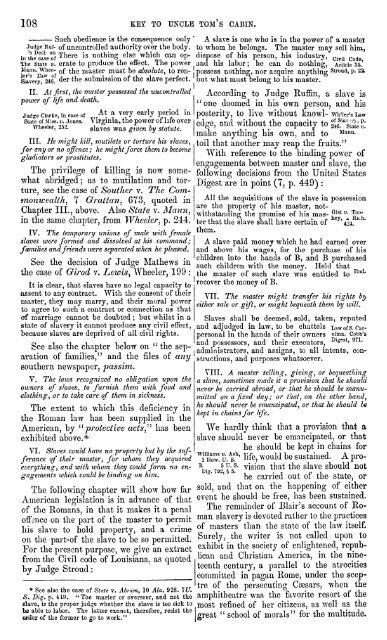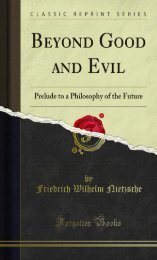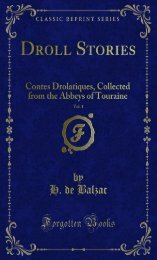UNCLE TOM'S CABIN
1iw97FV
1iw97FV
- No tags were found...
Create successful ePaper yourself
Turn your PDF publications into a flip-book with our unique Google optimized e-Paper software.
108<br />
KEY TO <strong>UNCLE</strong> TOM S <strong>CABIN</strong>.<br />
Such obedience is the consequence only- A slave is one who is in the power of a masfcei<br />
Judge Ruf- of uncontrolledauthority over the body. to whom he belongs.<br />
to<br />
L^eTf The master may sell him,<br />
There is nothingelse which can<br />
op- disposeof his person, his industry,<br />
The State v. erate to produce the effect. The CiTi, Coc]e<br />
power and his labor ; he can do nothing,Article 35.'<br />
Mann. Whee- 0f the master must be absolute, to renpossess<br />
nothing,<br />
^iveryf 2i6.f der the submission of the slaveperfect.<br />
nor acquireanythingStroud,p. 21<br />
but what must belongto his master.<br />
II. At first, the master possessed the uncontrolled<br />
Accordingto Judge Rufiin,a slave is<br />
power of lifeand death.<br />
"one doomed in his own person, and his<br />
Judge Clarke, in case of .A*a V*7 earlyV?"" " posterity, to live without knowl- wh'ier's Law<br />
State of Miss. v. Jones. Virginia, the power of life over<br />
Wheeler, 252. slaves was<br />
edge,<br />
givenby and without the capacity to ^"state I'.<br />
statute.<br />
make anythinghis own, and to Manntoilthat<br />
another may reap the fruits."<br />
III. He mighthill,mutilate or torture his slaves,<br />
forany or no offence ; he mightforcethem to become<br />
With reference to the<br />
gladiators<br />
prostitutes.<br />
bindingpower of<br />
engagementsbetween<br />
The privilege of master and slavețhe<br />
killingis now somewhat<br />
following decisions from the United States<br />
abridged ;<br />
as to mutilation and torture,<br />
Digestare in point(7,p. 449)<br />
see the case of Souther v. The Commonwealth,<br />
:<br />
7 Grattan,673, quoted in All the acquisitions of the slave in possession<br />
ChapterIII., above. Also State are the property v. Mann,<br />
of his master, notwithstanding<br />
in the same chapter, from Wheeler, p. 244.<br />
IV. The temporary unions of male with them.<br />
female<br />
slaves were formed and dissolved at his command; A slave paid money which he had earned over<br />
families and friends were separated when he pleased. and above his wages, for the purchaseof his<br />
children into the hands of<br />
See the decision of Judge Mathews in<br />
B, and B purchased<br />
such children with the money. Held that<br />
the case of Girod v. Lewis,Wheeler,199 : the master of such slave was entitled to Ibld*<br />
It is clearțhat slaves have no legalcapacity to recover the money of B.<br />
assent to any contract. With the consent of their<br />
VTI. The master might transfer<br />
master, they may marry, and their moral his rightsby<br />
power eithersale or to gift,or mightbequeaththem by will.<br />
agree to such a contract or connection as that<br />
of marriagecannot be doubted ; but whilst in a Slaves shall be deemed,sold,taken, reputed<br />
state of slavery it cannot produceany civil effect, and adjudged<br />
because slaves are deprivedof all civilrights.<br />
in law,to be chattels Law of s. Carpersonalin<br />
the hands of their owners olina. Cobb's<br />
"<br />
and<br />
See also the chapterbelow on the possessors, and their executors, Dl"est" 971-<br />
separation<br />
administrators, and assigns<br />
of families," and the filesof țo all intents,constructions,<br />
any<br />
and purposes whatsoever.<br />
southern neAvspaper, jmssim.<br />
VIII. A master selling,giving,or<br />
V. The laws recognized no obligation<br />
bequeathing<br />
upon the<br />
a slaveșometimes made it a provision that he should<br />
owners of slaves țo famish them with food and<br />
never be carried abroad,or that he should be manumitted<br />
clothing, or to take care of them in sickness.<br />
on a fixedday; or that,on the other hand,<br />
The extent to Avhich this deficiency in he should never be emancipated, or that he should be<br />
keptin chains for life.<br />
the Roman law has been suppliedin the<br />
American,by "<br />
protective acts" has been We hardlythink that a provision that a<br />
exhibitedabove.*<br />
slaveshould never be emancipated, or that<br />
VI. Slaves could have no property but he should be<br />
by the<br />
keptin chains for<br />
sufferance<br />
of their master, for whom they acquiredThT u<br />
Ash'life, would be sustained. A proeverytiling,<br />
and with whom theycould form no engagements<br />
Bijire!\'tvisi"n<br />
tnat tne s^ave sh"uld not<br />
1S' y"' '<br />
which could be bindingon him.<br />
be carried out of the state,or<br />
The following chapterwill show how far sold,and that on the happeningof either<br />
American legislation<br />
in advance of that event he should be free,has been sustained.<br />
of the Romans, in that it makes it<br />
The<br />
a<br />
remainder of Blair's account of Roman<br />
penal<br />
ofl'mce on the part of the master to permit slavery<br />
his slave to hold property, and a crime<br />
of masters than the state of the law itself.<br />
on the part- of the slave to be so permitted. Surely țhe writer is not called upon to<br />
For the exhibit in the<br />
presentpurpose, we givean extract<br />
society of enlightened, republican<br />
and<br />
from the Civil<br />
ChristianAmerica,in the nineteenth<br />
code of Louisiana, as quoted<br />
by JudgeStroud :<br />
century, a parallel to the atrocities<br />
committed in pagan Rome, under the sceptre<br />
of the persecuting Caesars,when the<br />
* See also the case of State v. Abram, 10 Ala. 928. 7Z7.<br />
"S.Dig. p. 419. "The roaster or overseer, and not the amphitheatre was the favorite resort of the<br />
slave,is the proper judge whether the slave is too sick to<br />
most refined of her citizens, as well as the<br />
be able to labor. The latter cannot, therefore, resist the<br />
order of the former to go to work." schoolof morals" for the multitude.<br />
the promiseof his mas-<br />
Gist ""<br />
^j"""<br />
ter that the slave shall have certain of ^UW""<br />
great "<br />
isdevoted rather to the practices




